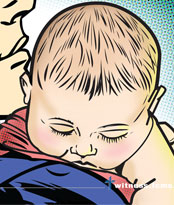
Apr 5, 2013
I recently had the opportunity to hear a presentation by a well-known prolife speaker on abortion. The argument against abortion, he said, lay in the answer to the question “Is the fetus a human being or not?” In meticulous fashion he presented his case which in substance said that if you can prove to an abortion proponent or a woman considering abortion that the fetus is a human being you have won your argument. Winning means that the proponent will give up his case or a woman considering abortion will not submit to an abortion.
Perhaps it is that I spent twenty years as hospital chaplain counseling, among others, women in their decision making that I find this argument overstated. Of all the women I counseled who were considering abortion I never had one tell me she did not believe the fetus within her was a human being. In fact, she would have thought it naive of me that I would even press the point. She would have said, “Of course, it is human, but I don’t want to be pregnant.”
In the non-Lutheran presentation referred to above, what struck me was the overbearance of Law and the absence of Gospel. Hammering away with rational explanation, the speaker concluded with an in-your-face video hideously depicting torn fetal body parts, all of which shattered any further reasonable discussion of the issue. Lutheran theology claims, and rightly so, that Law doesn’t transform people, the Gospel does. Women considering abortion are usually in crisis and the crisis needs to be addressed with attempts at healing. If addressed with compassion and truth spoken gently in the name of Christ who gave himself for desperate sinful men and women, the heart might be won over. Even if not, the path has at least been prepared a way for repentance to follow later. The Church needs to speak boldly against abortion, but more boldly still about the love of Christ for sinners considering and perhaps even participating in abortion.
About the Author: Dr. Richard C. Eyer is the retired director of pastoral care for Columbia Hospital, Milwaukee, Wis., and emeritus professor and director of the Concordia Bioethics Institute at Concordia University Wisconsin. He is the author of Marriage Is Like Dancing (CPH, 2007).
Reprinted from May 2000


Recent Comments